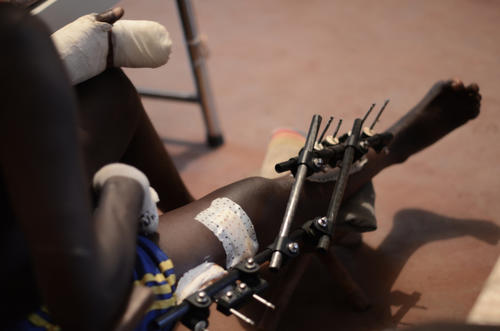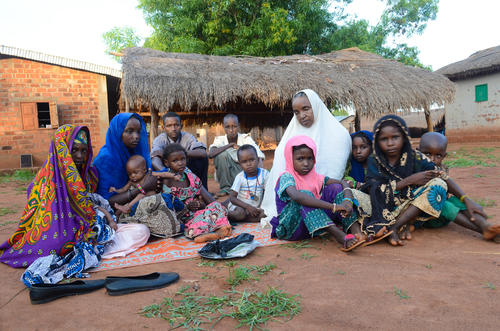Thomas is sitting in a ward in Bria hospital. All his fingers have been amputated, his left arm is broken and an external fixator supports one of his legs after machete blows cut through his thigh almost to the bone.
In Bria, as in other places in Central African Republic (CAR), fighting between various armed groups is increasingly accompanied by attacks against civilians.
Thomas, who is in his late sixties, is just one of the victims of the fighting that shook the town between 15 and 18 May 2017.
“It was eight in the morning on Tuesday 16 May. I was at home with my family and some friends who were staying with us,” he remembers.
“They forced their way in. Armed with machetes and clubs, they pushed the women out and beat us up. They said we were anti-Balaka, but I’ve been a safari guide for almost 40 years!”
The 47,000 inhabitants of the town known as “sparkling Bria”, because of the region’s numerous diamond mines, are controlled by different armed groups.
The mainly Muslim neighbourhood is home to combatants from FPRC and UPC (called “Arabs” to distinguish them from UPC Peuhl from whom they have dissociated themselves). In Christian neighbourhoods, so-called self-defence forces have been set up. It is a complex web of alliances and misalliances that sometimes explodes, as it did in the middle of May.
That time, the Christian neighbourhoods were targeted. In November 2016 and March 2017, it was Peuhl communities who were the primary victims of the violence. More than 2,800 Peuhl people have since sought refuge in the Gobolo enclave, which is under the protection of UN peacekeeping forces.
There no longer seems to be any distinction made between civilians and combatants, which is why people flee at the first opportunity. Whole neighbourhoods of Bria have been emptied of their inhabitants, and the fighting has left houses with bullet holes on their fire-blackened walls.
“I’ve nowhere to go home to,” says Thomas. “Everything’s been destroyed or looted. All the gifts my European customers gave me to thank me for my services as their guide have been stolen. I’ve lost everything. My family and I have found refuge for now in the hospital, but if we have to leave, we’ll go into the forest. We’re not going back to our neighbourhood.”

Like Thomas and his family, around 6,000 people prefer to sleep overnight in the hospital compound.
Some 41,000 people — over 85 per cent of Bria’s population — have fled their homes. Most of them have sought refuge in PK3 displacement site. The camp was set up to accommodate 3,000 people after fighting broke out in November 2016; 25,000 people are there now, and their numbers continue to grow daily.
The most fortunate are those who arrived eight months ago and are set up in the middle of the camp. All around them are makeshift shelters, made out of a few poles and pieces of plastic sheeting salvaged from looted homes, with just mats on the bare earth.
It’s the rainy season now. When the weather is good, children run everywhere but, when it rains, the families huddle together, ankle-deep in mud, under inadequate plastic sheeting. The camp’s residents have ironically nicknamed PK3 “Ledger”, the name of the biggest hotel in Bangui.
MSF has increased the number of mobile clinics it launched in PK3 camp last November for children under the age of 15 years. During the past two weeks, the teams have given more than 600 consultations, principally for malaria. MSF is also providing water, as the shortage of latrines and water on the site could prove catastrophic in the event of an epidemic.
The humanitarian response is slow in coming to Bria and new arrivals have yet to receive basic necessities, such as plastic sheeting and soap. Acute paediatric cases are referred to the hospital where, between 15 and 18 May 2017, MSF treated 44 wounded patients, including Thomas.
In addition to PK3, MSF’s mobile clinics go to Kolaga, 10 kilometres south of Bria, where people recently displaced are now arriving from the town’s southern neighbourhood and more remote areas, where abuse is committed amid general indifference.
MSF continues to provide consultations to people in Gobolo, the enclave in Bria, where Peuhl communities have been prisoners of the insecurity since November 2016.
The attack against Thomas is just one of a growing number of incidents in Bria and east CAR, where civilians are increasingly targeted. All the country’s communities are vulnerable in a cycle of violence that feeds on a climate of repeated attacks and reprisals.



